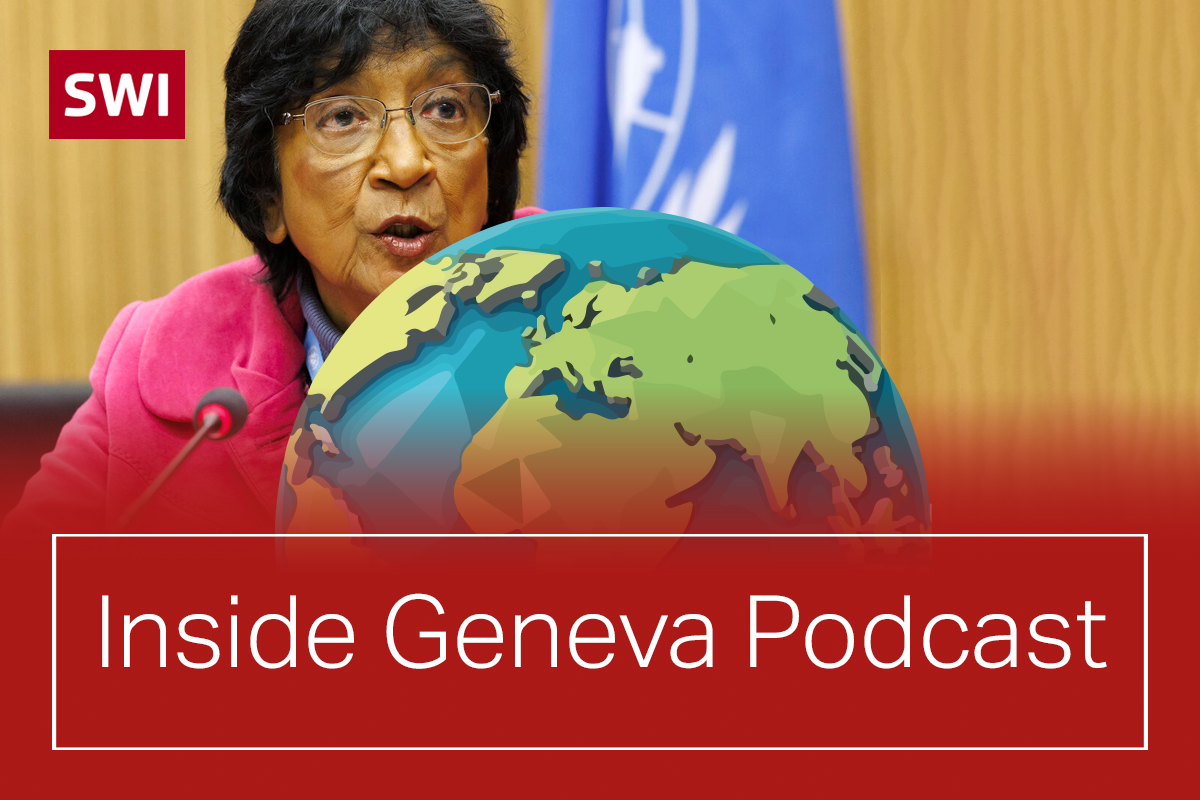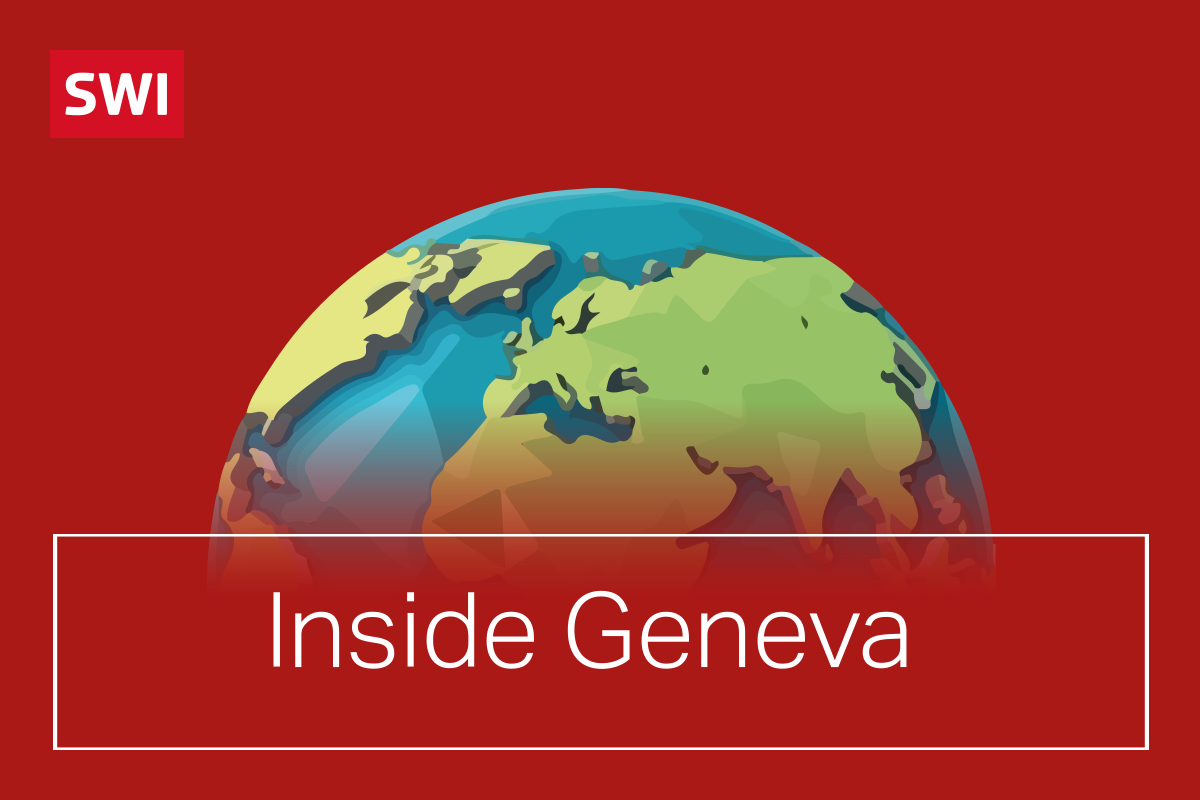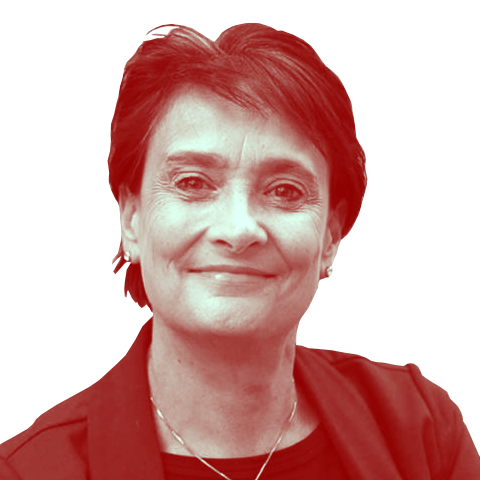Inside Geneva at 100
This week, Inside Geneva is marking a big milestone – our 100th podcast. The idea for the podcast started back in 2019, over a coffee with colleagues from SWI swissinfo.ch’s Geneva bureau. Some readers and listeners will know that back then I wrote a monthly feature article for SWI, taking a look at some of the issues being discussed in international Geneva.
Why not, we thought, try a podcast as well? After all, everyone else seemed to be launching podcasts, the market was booming, and, in Geneva, we had a wealth of experts, diplomats and humanitarians, ready to talk about the big challenges facing our planet.
We started, with a couple of pilots, in September 2019, not knowing then how soon the world would be plunged into the crisis of the Covid-19 pandemic. Our first episode brought in the United Nation Refugee Agency and the Red Cross to discuss ways of challenging negative and inaccurate populist rhetoric about migrants and asylum seekers. The pandemic may – we hope – be becoming a dim memory, but the unscrupulous politicisation of the world’s most vulnerable people sadly continues.
And in January 2020 we had our first podcast on the new coronavirus which had emerged in China, and the astonishing restrictions (that would never happen in Europe, we naively commented) imposed by Beijing to try to control it. Over the course of 2020, we had to eat our words of course, with several further podcasts devoted to Covid-19, and the way it upended our way of life.

More
Inside Geneva talks to Navi Pillay: from the apartheid regime to the UN
100 highlights … from decolonising aid
In this week’s Inside Geneva, we select some of our favourite highlights from among our 100 episodes. We decided in the end not to include Covid-19, or the war in Ukraine, despite covering both on several occasions, but listeners particularly interested in those topics can find them – every episode is on all the usual podcast platforms, just look for Inside Geneva.
Instead, we thought we’d profile some of the episodes which may not make so many headlines, but which clearly interested our listeners. Our most downloaded Inside Geneva of all time discussed whether humanitarian aid needs to be “decolonised”. Lata Narayanaswamy of the University of Leeds thinks it does, telling Inside Geneva we should rethink aid “as a form of reparation, as a form of social justice for historical and continuing harm.”

More
Do we need to decolonize aid?
Our analyst Daniel Warner isn’t entirely convinced, pointing out neither he, nor westerners involved in humanitarian aid, had any involvement in colonialism. But Tammam Aloudat, formerly with Medecin Sans Frontières and now with Geneva’s Graduate Institute, tends to agree with Narayanaswamy, describing repeated well-meaning aid efforts, continuing to this day, based entirely on the assumption that the western aid agency (often from the same country as the former colonial power) knows best.
…to Syria
In 2021 Inside Geneva asked humanitarians to share their assessment, and their personal recollections, of the conflict in Syria, which in March of that year was a decade old.
Jan Egeland, former head of the UN’s humanitarian taskforce for Syria admits, with a heavy heart, that international diplomacy “failed” Syria, though he takes some comfort from the aid deliveries, painstakingly negotiated by his team, which the UN managed to bring to besieged Syrian cities, thereby, he hopes, saving at least some lives.
Fabrizio Carboni, the ICRC’s regional director for the Middle East, recalls his colleagues weeping when they witnessed the utter destruction of Aleppo. “Apocalyptic”, he remembers, “what I saw will stay with me for the rest of my life.”

More
Syria, the forgotten crisis?
…human rights investigations
And what about human rights? The UN Human Rights Council meets several times a year, dozens of reports are published. Sometimes, we journalists feel, there is just too much. But what is it like to be a human rights investigator? To listen to evidence of atrocities, often of the utmost brutality, prepare your report, and yet know that nothing may come of it? After all, the human rights council has no prosecutorial power, it can only recommend, condemn, and advise.
Chris Sidoti, former head of the UN’s fact finding mission on Myanmar, reveals some frustration when he tells us “I still know that the Myanmar butchers who are responsible for what happened may never individually be brought to justice,” and urges the international community to “get off their arses and do something”.
Andrew Clapham, member of the UN commission on human rights in South Sudan, agrees that the work can be harrowing and exhausting, but says the impact of UN human rights investigations should not be underestimated, whether it’s the validation the investigators can bring to survivors of violations simply by documenting their suffering, or the global attention those UN reports often receive.
“You have to get through the day thinking that this work is leading somewhere, and that you’re not just going to save the world overnight.”

More
What does the Human Rights Council mean to victims of atrocities?
…and killer robots
Another of our most popular episodes was one which discussed the long – some might say tortuous – negotiations going on at the UN about rules to govern lethal autonomous weapons, sometimes known as killer robots. The ICRC, the guardian of the Geneva Conventions, is highly concerned at the prospect of a machine “deciding who lives or dies”, and argues that “meaningful human control” must be maintained.
But Paola Gaeta, law professor at Geneva’s Graduate Institute, says defining “meaningful human control” may be tricky. Citing apps like Google maps, she points out that the lines between machine and human control are already blurred simply because we trust the machines, and do what they say.
And Mary Wareham of Human Rights Watch (which is campaigning for a total ban on killer robots) asks what happens if autonomous weapons are used in a way that inflicts such damage on civilians that it could be classed as a war crime?
“Do you hold the commander responsible who activated the weapons system? There’s what we call an accountability gap when it comes to killer robots.”
That’s just a small flavour of the many topics we’ve had on Inside Geneva over our 100 episodes. My personal thanks go to all the wonderful guests we’ve had on the show, some of them sharing very difficult life experiences.

More
Killer robots: should algorithms decide who lives or dies?
To our listeners out there, do let us know what topics you might like us to discuss over the coming months, we’re always up for new ideas, and you can email us with your questions and comments at insidegeneva@swissinfo.ch.

In compliance with the JTI standards
More: SWI swissinfo.ch certified by the Journalism Trust Initiative
You can find an overview of ongoing debates with our journalists here . Please join us!
If you want to start a conversation about a topic raised in this article or want to report factual errors, email us at english@swissinfo.ch.